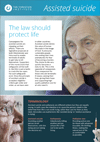A debate in the House of Commons ended last night before the issue of assisted suicide could be discussed.
The law on assisted suicide had been scheduled for debate last night as MPs considered the Coroners and Justice Bill.
An amendment to make it legal to escort individuals overseas to end their lives had been tabled by former health secretary Patricia Hewitt.
However, the issue will now have to wait until the Bill is passed to the House of Lords, where Lord Joffe is among those Peers expected to make an attempt to legalise assisted suicide.
In a letter to The Times newspaper today Professor John Loughlin, of Cardiff University, warns that Lord Joffe’s position is based on the idea that “there can be an individual choice that has no consequences for the rest of society”.
He warns that euthanasia laws in the Netherlands which were strict initially now allow assisted suicide for the depressed and children as young as twelve.
“We should take seriously the slippery slope argument,” he writes.
Mrs Hewitt indicated when tabling her amendment that she did not expect it to be selected for debate, but said her larger aim was to bring about the legalisation of assisted suicide in the UK.
It was suggested last week that the amendment was really the work of well-known supporter of assisted suicide, Liberal Democrat MP Dr Evan Harris.
Conservative MP Nadine Dorries obtained an email from one of Dr Harris’s researchers containing a draft amendment with the same wording as that tabled by Mrs Hewitt, a Labour MP.
It is thought that the Liberal Democrats are uneasy about Dr Harris’s growing reputation for pushing forward anti-life legislation, which has earned him the nickname ‘Dr Death’.
A recent study shows that most doctors are opposed to assisted suicide. The British Medical Association and General Medical Council are against the practice.
The Prime Minister has also made clear his opposition to assisted suicide on several occasions.
Last week he confirmed that his view had not changed since last December, when he said: “I believe that it is necessary to ensure that there is never a case in this country where a sick or elderly person feels under pressure to agree to an assisted death or somehow feels it is the expected thing to do. That is why I have always opposed legislation for assisted deaths.”

